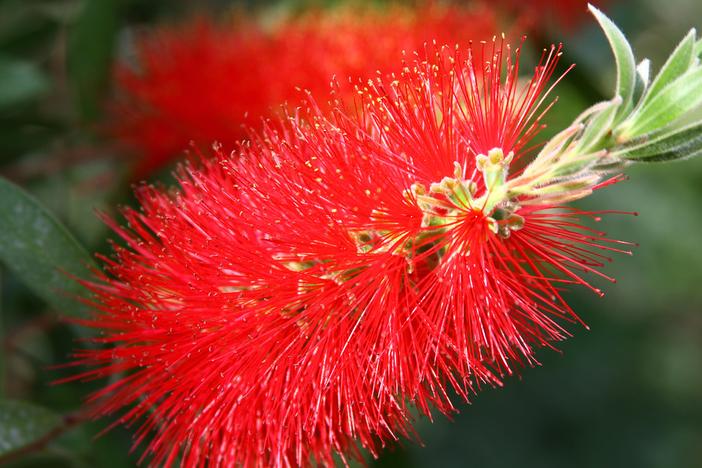Crimson Bottlebrush
(Callistemon citrinus)
Crimson Bottlebrush (Callistemon citrinus)
/
/

Chris Waits
CC BY 2.0
Image By:
Chris Waits
Recorded By:
Copyright:
CC BY 2.0
Copyright Notice:
Photo by: Chris Waits | License Type: CC BY 2.0 | License URL: https://creativecommons.org/licenses/by/2.0/ | Uploader: waitscm | Publisher: Flickr




















































Estimated Native Range
Summary
Callistemon citrinus, commonly known as Crimson Bottlebrush, is an evergreen shrub or small tree native to the wetlands, streams, and moist woodlands of Southeastern Australia. It typically grows to 1–3 meters (3–10 feet) high and wide, but can reach up to 5 meters (20 feet) tall. The species is characterized by its stiff, needle-like leaves and distinctive cylindrical red flower spikes resembling a bottlebrush, which bloom mainly in November and December, but can appear throughout the year in ideal conditions. The flowers are highly attractive to birds, particularly honeyeaters, and are followed by woody, cup-shaped fruit capsules that remain closed until the plant dies or is damaged.
Crimson Bottlebrush is valued for its vibrant flowers and ability to attract wildlife. It is widely used in ornamental horticulture for urban planting, borders, and as a specimen plant. This species adapts well to a range of soil types, provided they are well-drained, and it thrives in full sun. It is drought-tolerant once established and can withstand light frosts, making it a low-maintenance choice for gardeners. However, it can be susceptible to root rot if overwatered or planted in poorly drained soils. It is not typically invasive but should be monitored as it can self-seed readily in ideal conditions.CC BY-SA 4.0
Crimson Bottlebrush is valued for its vibrant flowers and ability to attract wildlife. It is widely used in ornamental horticulture for urban planting, borders, and as a specimen plant. This species adapts well to a range of soil types, provided they are well-drained, and it thrives in full sun. It is drought-tolerant once established and can withstand light frosts, making it a low-maintenance choice for gardeners. However, it can be susceptible to root rot if overwatered or planted in poorly drained soils. It is not typically invasive but should be monitored as it can self-seed readily in ideal conditions.CC BY-SA 4.0
Plant Description
- Plant Type: Shrub, Tree
- Height: 6-15 feet
- Width: 5-3 feet
- Growth Rate: Moderate
- Flower Color: Red
- Flowering Season: Spring, Summer
- Leaf Retention: Evergreen
Growth Requirements
- Sun: Full Sun
- Water: Medium
- Drainage: Fast, Medium
Common Uses
Bee Garden, Bird Garden, Border Plant, Butterfly Garden, Deer Resistant, Drought Tolerant, Fragrant, Hedges, Hummingbird Garden, Potted Plant, Rabbit Resistant, Showy Flowers, Street Planting
Natural Habitat
Wetlands, streams, and moist woodlands of Southeastern Australia
Other Names
Common Names: Lampborste
Scientific Names: Callistemon citrinus , Melaleuca citrina , Callistemon cunninghamii , Metrosideros citrina , Callistemon citrinus var. splendens , Callistemon laevis , Callistemon lilacinus f. albus , Callistemon lilacinus f. carminus , Metrosideros lanceolata
GBIF Accepted Name: Callistemon citrinus (Curtis) Skeels